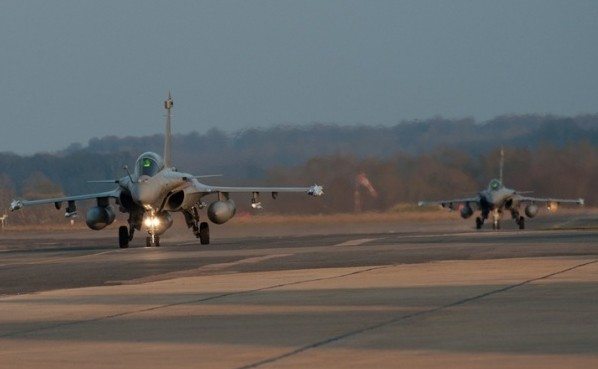France and the US have agreed on a new structure to coordinate the military operations in Libya. NATO allies have agreed to use their navies to enforce a UN-backed arms embargo, as the fighting continues.
French President Nicolas Sarkozy, British Prime Minister David Cameron, and US President Barack Obama have agreed that NATO’s command structure should play a ‘key role’ in the ongoing military operation in Libya. However, specifics of this agreement have not yet been agreed upon, including the extent of NATO’s role in commanding the operation and what nation would eventually be in charge should NATO take over completely.
“I would expect that over the next several days we will have clarity and a meeting of the minds of all those who are participating in the process,” Obama said from El Salvador.
Earlier in the day, NATO had come to the decision to use its forces to enforce a United Nations arms embargo on Libya.
In an effort to find a consensus on who should lead the military action against Libya, French Foreign Minister Alain Juppe Tuesday called for the creation of a special committee that would guide the operations. The group, Juppe said, would comprise the foreign ministers from the coalition countries involved in the airstrikes, as well as from the Arab League.
“We should meet in the coming days in Brussels, London or Paris and continue to meet regularly to show clearly that political oversight is there,” he said. “Of course the Arab world will find its place,” he added.
The initial military operation has included involvement from France, Britain, Denmark, Italy, Spain, Belgium and Canada.
Juppe said the military operations could stop at any moment, as soon as Libyan leader Moammar Gadhafi adhered to all the stipulations of the UN resolution.
Turkey and Russia, meanwhile, continued to denounce the military operation altogether, while Italian Foreign Minister Franco Frattini called for command to pass to NATO.
Staying out of the fight
Germany has announced that some ships and air crews would be withdrawn from NATO missions in the Mediterranean to avoid being pulled into the Libya conflict, as NATO becomes more involved.
Two frigates and two other ships with crews totaling 550 and around 50 additional troops participating in NATO air surveillance would be placed under German command again.
Germany did not object to NATO taking the lead, but Foreign Minister Guido Westerwelle reiterated that his country would not send troops to Libya.
Former German Foreign Minister Joschka Fischer on Tuesday poured scorn on Berlin’s decision to abstain in the UN Security Council vote, describing it as a “scandalous mistake” and the government’s behavior as a “farce.”
“Germany has forfeited its credibility in the UN and in the Middle East,” Fischer wrote in the Süddeutsche Zeitung daily.
Fighting continues
Western forces launched airstrikes on strongholds of Libyan leader Moammar Gadhafi for a third night, while explosions and gunfire were heard again near Gadhafi’s compound in the capital Tripoli on Tuesday.
There were also reports that Gadhafi’s forces were attacking rebels in the northwestern town of Zintan with heavy weapons, as well as shelling the rebel-held city of Misrata. Dozens of people were reported to have been killed.
The US Africa command said that one of its fighter jets had crashed overnight over Libya, reportedly due to mechanical failure. Both crew members had managed to eject and were safe, said a spokeswoman.










